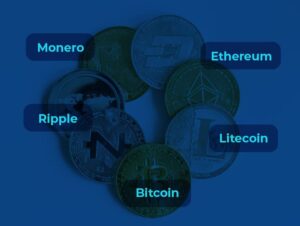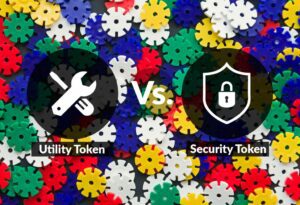
Table of Contents
ToggleSecurity Token and Utility Token: What’s the difference?
There is no doubt that the blockchain is causing great disruption in many sectors and is becoming the focus of many businesses.
The use of tokens is one of the important factors that have contributed to the success of blockchain technology. In this article, we will clarify the token concept and reveal the difference between a Security Token and a Utility Token.
What are tokens
n the universe of computer security and in that of crypto-currencies, a token is a resource, a utility or a unit of value issued by an organization and, in the specific case of crypto-currencies, it is accepted by a community and is also supported by a blockchain.
Although they are used interchangeably, there is a basic difference between a token and a crypto-currency that we will quickly explain below.
While a krypton currency operates independently and uses its own platform (e.g. bitcoin), a token is a krypton currency built on top of an existing blockchain (Omisego is an Ethereum-based token).
You can get more information on this subject in the article dedicated to Difference between tokens and crypto-currencies.
What are ICOs?
The ICO or Initial Coin Offering is a form of financing in the form of mass sales. It is the version of crowdfunding with crypto-currencies. We could define them as a public crowdfunding effort, whose objective is to help a new idea or project take shape.
In the case of ICOs, investors, instead of buying shares in a company, acquire tokens using crypto currencies such as Bitcoin and Ether.
ICOs are ideal as a source of financing for start-ups and allow certain projects to be developed outside the legal framework.

How do they work?
The developer issues a limited number of tokens to ensure that these tokens have a value, linked to an ICO.
The tokens can have a static predetermined price or increase or decrease depending on how the mass sale goes.
During the time it takes, users have the possibility to buy tokens for the new project in exchange for Ether or bitcoin and participate in the financing of the project.
Types of Tokens
As we have seen, when a company collects funds in an initial coin offering (ICO), it does so by issuing tokens that it distributes to buyers interested in contributing crypto-funds.
Within the tokens we can find subtypes such as Equity Token, Security Token and Utility Token, and all have a representation of the value of a project or a company.
What is a Security Token?
A Security Token: is a type of asset related to financial securities that take their value from the company that issues and holds them, but have no value from a financial fee. Rather, they are liquidated as financial securities provided by regulatory entities.
Security tokens are therefore similar to traditional shares because their value comes from an external negotiable asset. They are an investment contract that represents the legal ownership of a physical or digital asset such as real estate, ETF etc. This ownership must be verified within the blockchain.
Once ownership has been verified, Security token holders can:
- Exchange their tokens with other assets;
- Use them as collateral for a loan;
- Store them in different wallets.
The most surprising thing about Security tokens is the way they have completely redefined the meaning of OWNERSHIP and how they democratize assets that can now be redistributed equitably among people around the world.
What is a Utility Token?
A Utility Token represents access to a company’s future products and services. Behind a Utility Token there is no tangible product or service, so they are designed not to be a financial investment, but they derive their value from the platform itself.
Utility tokens are the most popular form of token, especially given the rise of ICO in 2017. Companies have used these tokens to raise millions of dollars in funding. However, this is only one of the roles they play.
Difference between Security Token and Utility Token
At the time we want to understand the substantial differences between a Security token and a Utility token, to determine which group a token belongs to, it will be necessary to assess whether it qualifies as a title according to the relevant regulatory entities.
Howey test
In order to determine which group a token belongs to, the Howey Test is applied in the United States, an evaluation system created and introduced by the Supreme Court of the United States through the Securities Act of 1933 and the Securities Exchange Act of 1934.
This test determines whether a transaction can be considered an investment or a security.
Howey’s test can be expressed as three elements.
- An investment of money;
- In a joint venture;
- With an expectation of profit primarily from the efforts of others.
In summary, a transaction is considered an investment if, for the person delivering an amount of money, there is an expectation of profit. The money must be given in full to a “joint venture”.
All three elements must be satisfied for a token to be considered a security token.
In conclusion, the main differences between the two tokens are as follows:
| SECURITY TOKENS | UTILITY TOKENS |
| Regulated by the laws of each country | No regulation |
| Implementation and slow release. Requires the approval of the country’s title control authorities | Distribution and rapid issuance |
| Value associated with the company | Highly speculative value |
| They represent part of the company’s value | They can be exchanged for products or services of the issuing company. |
| They allow direct participation and voting within the company and the project. | No participation or voting rights |
| Its regulation provides greater security | Tendency to swindle due to lack of regulation |
So to conclude, while a Security token grants rights to share in future revenues or to increase the value of the issuing entity, a Utility token grants rights to access services or products within the blockchain, guaranteeing the digitalization of the rights.
In addition, unlike security tokens, utility tokens are not used as investments, as they can be exempted from federal securities laws if properly configured.
Finally, Security tokens are considered more secure than utility tokens due to the strict regulations imposed.







